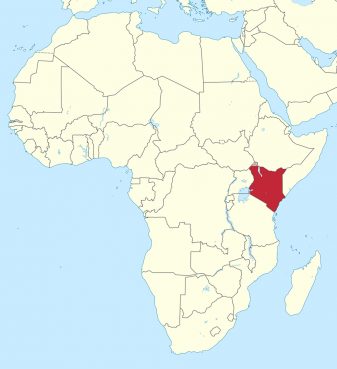
NAIROBI, Kenya (RNS) — In a predominantly Anglican region of western Kenya, a long-serving female priest has been elected an Anglican bishop, making her the second woman to hold that rank in a country where the consecration of women as bishops is still controversial.
The Rev. Rose Okeno, 52, will lead Butere, a rural diocese where a majority of the faithful are small-scale farmers and traders. Okeno was favored by more than three-quarters of the electoral college delegates, beating two male contenders. Her consecration as bishop is planned for September.
Okeno’s election, following quickly after Kenya’s first appointment of a female bishop in January, underlines a new trend in Kenya and in Africa, where more women clerics are taking top leadership positions in the church.
“I see it as a calling from God,” Okeno, who has served the Anglican church for more than 20 years, told Religion News Service in a telephone interview. “There could be some challenges, especially given how our society views women, but it’s majority men who elected me. So this is a confirmation that I am their leader. I am confident.”
Earlier this year, the Rev. Emily Onyango was ordained as an assistant bishop of Bondo, a diocese on the edge of Lake Victoria. The 59-year-old scholar and researcher became Kenya’s first female Anglican bishop and the first in the Anglican church in East and Central Africa.
“I may be the first female bishop in ACK (Anglican Church of Kenya) from the Diocese of Bondo, and may the doors for other female bishops be open. I will join indeed a house of brother bishops but pray they will remember to include me as a sister bishop,” Onyango said in her acceptance speech on Jan. 20.

Kenya, red, located in eastern Africa. Map courtesy of Creative Commons
In 2012, the Rev. Ellinah Ntombi Wamukoya became Africa’s first Anglican female bishop when she was elected as bishop of Swaziland. Wamukoya died of COVID-19 in January this year.
In 2016, South Sudan Primate Daniel Deng Bul consecrated the Rev. Elizabeth Awut Ngor as an assistant bishop of the Diocese of Rumbek.
While the Kenyan canon permits women bishops, that conflicts with a moratorium by the Global Anglican Future Conference, which does not allow women bishops. The 2018 moratorium allows the consecration of only men to the episcopate until such a time when there is a consensus on the matter. Most African provinces are affiliated with GAFCON, but the dioceses in the provinces are independent.
Religious experts predict change is coming to the continent as more young women are becoming priests in the church. Some of the church’s clerics observe it’s only a matter of time before the number of female bishops increases.
The Anglican church in Africa has an estimated following of 40 million, with the highest concentration in Nigeria and Uganda. Kenya, South Africa and Tanzania have sizable populations as well. Most of these provinces are conservative.
According to Jesse Mugambi, a professor of philosophy and religious studies at the University of Nairobi, women moving to take key positions in the church is a growing trend. He feels it’s late coming, however, since the most serious and committed people in churches are often women and young people.
“The old idea that religions have to be led by an old man has to change. If we delay, we will pay for it,” said Mugambi, while noting that women make up the vast majority of most church congregations.
Like many provinces in Africa, the Kenyan church approved the ordination of women as priests in the 1990s, but the number of women becoming priests has lagged due to the patriarchal nature of the church, according to the Rev. Joseph Njakai, an Anglican priest in Mount Kenya West Diocese.
“There is no resolution in the entire church on making women bishops. The issue is very controversial and triggers resistance,” said Njakai.
When Onyango was elected, attempts were made to stop her ordination. Six lay members of the church petitioned the country’s primate that the election was not procedural and said it had disregarded the canon law. They also claimed the bishop in charge of the election had used blackmail, threats and intimidation.
“There are no tangible arguments against the women’s ordination as bishops in the Kenyan church. It is how we inherited the church. Anything in priesthood is he,” said Njakai, while highlighting a split between conservatives and liberals.
“Western Kenya dioceses are liberal and are ordaining women. Most of the Kenyan Anglican dioceses are conservative,” he added.
